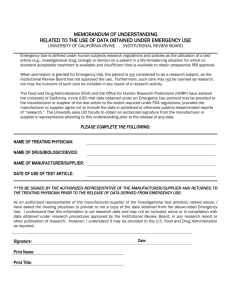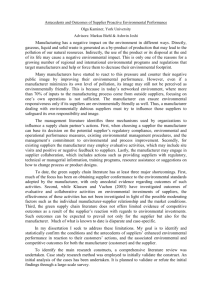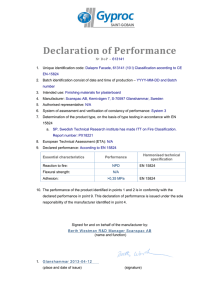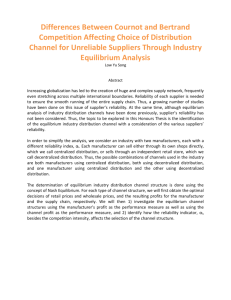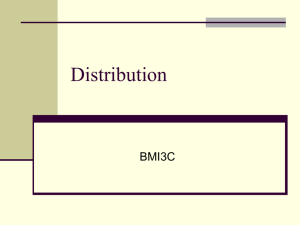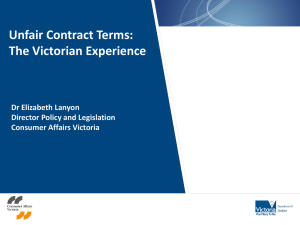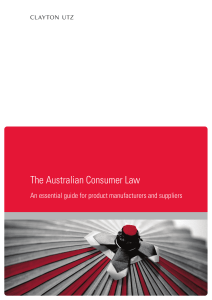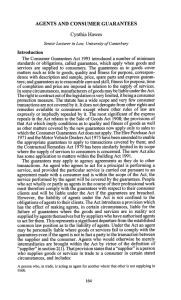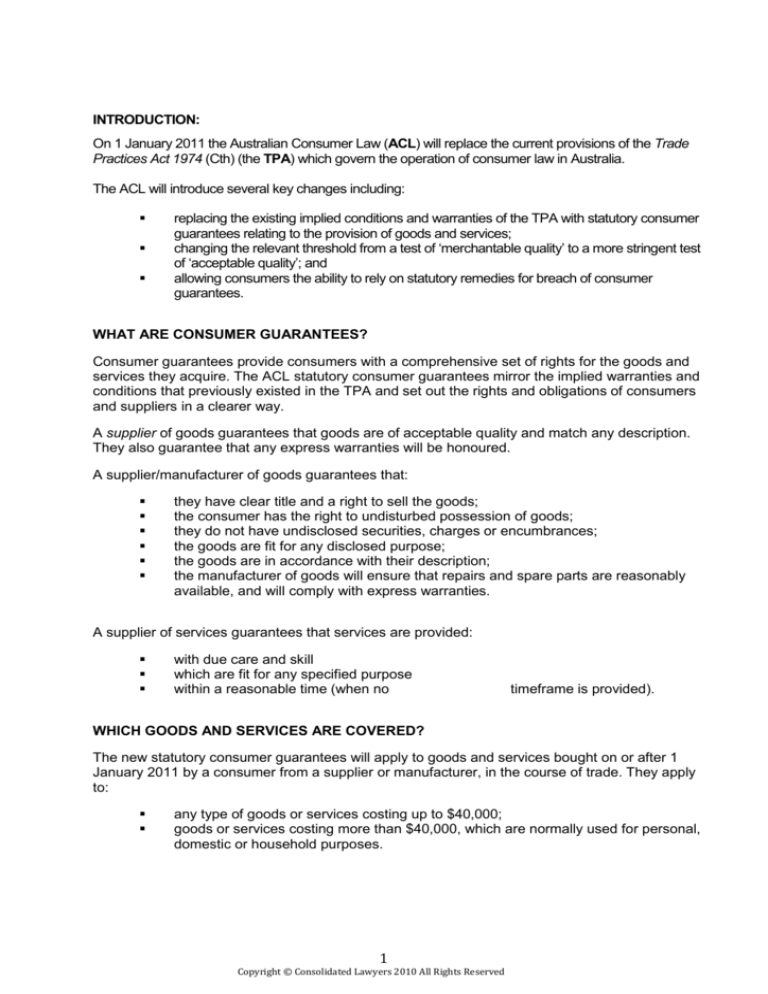
INTRODUCTION:
On 1 January 2011 the Australian Consumer Law (ACL) will replace the current provisions of the Trade
Practices Act 1974 (Cth) (the TPA) which govern the operation of consumer law in Australia.
The ACL will introduce several key changes including:
replacing the existing implied conditions and warranties of the TPA with statutory consumer
guarantees relating to the provision of goods and services;
changing the relevant threshold from a test of ‘merchantable quality’ to a more stringent test
of ‘acceptable quality’; and
allowing consumers the ability to rely on statutory remedies for breach of consumer
guarantees.
WHAT ARE CONSUMER GUARANTEES?
Consumer guarantees provide consumers with a comprehensive set of rights for the goods and
services they acquire. The ACL statutory consumer guarantees mirror the implied warranties and
conditions that previously existed in the TPA and set out the rights and obligations of consumers
and suppliers in a clearer way.
A supplier of goods guarantees that goods are of acceptable quality and match any description.
They also guarantee that any express warranties will be honoured.
A supplier/manufacturer of goods guarantees that:
they have clear title and a right to sell the goods;
the consumer has the right to undisturbed possession of goods;
they do not have undisclosed securities, charges or encumbrances;
the goods are fit for any disclosed purpose;
the goods are in accordance with their description;
the manufacturer of goods will ensure that repairs and spare parts are reasonably
available, and will comply with express warranties.
A supplier of services guarantees that services are provided:
with due care and skill
which are fit for any specified purpose
within a reasonable time (when no
timeframe is provided).
WHICH GOODS AND SERVICES ARE COVERED?
The new statutory consumer guarantees will apply to goods and services bought on or after 1
January 2011 by a consumer from a supplier or manufacturer, in the course of trade. They apply
to:
any type of goods or services costing up to $40,000;
goods or services costing more than $40,000, which are normally used for personal,
domestic or household purposes.
1
Copyright © Consolidated Lawyers 2010 All Rights Reserved
A CHANGED STANDARD:
In addition to the ACL applying a national standard for consumer guarantees the provisions in
relation to consumer guarantees alter the position of the TPA with respect to the standard or
quality of the goods and services provided.
The former position of ‘merchantable quality’ has now been replaced with a guarantee of
‘acceptable quality’ which takes a more stringent stance on suppliers of goods and services to
ensure the required standards of quality are met.
Acceptable quality is defined as:
fit for purpose;
acceptable in appearance and finish;
free from defects;
safe; and
durable.
The above criteria are applied in accordance with what a reasonable consumer, who is
completely aware of the condition of the goods, would regard as acceptable. Any representation
made about the goods or on packaging is given consideration along with the nature and price of
the goods.
If the reasons as to the unacceptable quality were brought to the consumer’s attention, if the
consumer should have reasonably known of the unacceptable quality, or if the consumer caused
or failed to take reasonable steps to prevent the goods becoming of unacceptable quality, the
goods will not fail under the acceptable quality test.
STATUTORY REMEDIES AVAILABLE:
Under the new ACL consumers will now be able to rely on statutory remedies for a breach of the
consumer guarantee provisions.
In order to seek a remedy under the statute the following conditions must be satisfied:
Was there a breach that can be remedied; and
Does the breach constitute a 'major failure’
If the breach only satisfies the first element above and does not meet the threshold of a major
failure the consumer is entitled to remedy in the form of a repair, replacement or refund. Failure to
remedy the breach further entitles the consumer to pursue the supplier for recovery of reasonable
costs incurred as a result of the failure, reject the goods or terminate the contract.
The consumer may also recover damages against the supplier for reasonably foreseeable loss or
damage, including consequential damages which arise from the breach.
Major failure:
A major failure will occur if:
the goods are unsafe or the service creates an unsafe situation;
the goods/services significantly depart from their description;
the goods/services would not have been acquired by a reasonable consumer who
was acquainted with the issue;
if the goods/services are substantially unfit for their purpose or a disclosed purpose
made known to the consumer prior to purchase and cannot be remedied in
reasonable time; or
if the goods/services cannot be reasonably expected to deliver a result made known
to the consumer prior to purchase within a reasonable timeframe.
If a breach is a major failure the consumer has the right to either reject the goods or obtain a
refund or replacement. The consumer is also entitled to terminate the contract for supply and be
compensated for any reduction in the value.
MANUFACTURER’S INDEMNITY:
A consumer may request that a supplier deal with a situation whereby goods are not of acceptable
quality due to a manufacturing defect, may not match a description given by the manufacturer or
are unfit for a purpose specified by the manufacturer.
In this situation a manufacturer must compensate the supplier for any losses as a result of the
unacceptable quality due to the manufacturer. The amount to be reimbursed can include any
compensation paid to the consumer for reasonably foreseeable consequential losses.
Limitation:
Under the ACL a supplier has three years from the date that they fixed any problems with the
goods or from the date the consumer took legal action against the supplier, in which to request a
reimbursement from the manufacturer. Manufacturers cannot contract out of this obligation to
reimburse the supplier.
However, when goods are not used for personal, domestic or household purposes and it is fair
and reasonable to do so, the manufacturer can limit their liability through:
replacement;
repair; or
obtaining equivalent goods.
Suppliers and manufacturers can also enter into agreements as to what each party will cover as
long as it does not affect the consumer’s rights.
Information Request
For more information regarding the information
contained within this Fact Sheet please contact
our Bechara Shamieh, Managing Director in
our Sydney office on (02) 9283 2566.
24hr client access 131 LAW (529)
Sydney
Level 6, Suite 6.02, 233 Castlereagh Street
Sydney NSW 2000, DX 11618 Sydney Downtown
T +61 9283 2566 | F +61 2 9283 7594
Parramatta
Level 2, Suite 2.01, 91 Phillip Street
Parramatta NSW 2150, DX 8265 Parramatta
T +61 2 9762 0400 | F +61 2 9762 0401
CONSOLIDATED LAWYERS P/L. ABN 74 125 262 526. ACN 125 262 526
Liability limited by a scheme approved under Professional Standards Legislation

